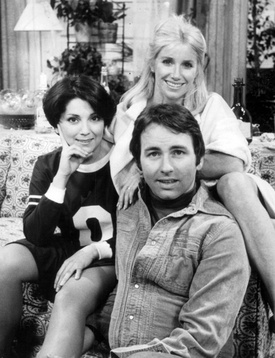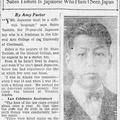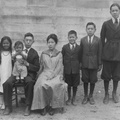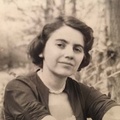The late television writer/producer Norman Lear, who died in 2023 at the age of 101, has been celebrated for revolutionizing the TV sitcom during the 1970s by producing such landmark shows as All in the Family, The Jeffersons, Sanford and Son, and One Day at a Time. Storylines for these shows included such serious real-life issues as racial bigotry, divorce, rape, abortion, poverty, and labor strikes. Lear has also been praised in many memorial accounts for his generosity in mentoring and shaping the careers of notable actors, writers, and directors. One intriguing but less-known protege of Lear’s was Kim Weiskopf, a legacy comic writer/producer who was a mixed-race Japanese American.
Kim Weiskopf’s father was Robert Weiskopf, a Jewish American from Chicago. The elder Weiskopf was a comedy writer who, together with his longtime writing partner, Bob Schiller, wrote scripts during the 1950s for the classic sitcom I Love Lucy and also for Lucille Ball’s follow up sitcom The Lucy Show. The team later wrote scripts for the Norman Lear-produced sitcoms All in the Family and Maude (which they also co-produced).
Kim’s mother Eileen (AKA Irene) Ito Weiskopf was a Nisei who grew up in Chicago, the youngest of three accomplished sisters whose varied careers I have detailed in another column. Eileen met Robert Weiskopf when they were both studying at University of Chicago. After college, Eileen moved to Washington DC, where she studied art at the Corcoran School and worked as a Junior Research Clerk at the Interior Department (where her older sister Josephine Ito was also employed). Robert and Eileen Ito Weiskopf married in 1940 and would remain married until Robert’s death sixty-one years later.
Kim Robert Weiskopf was born in New York on April 10, 1947, and spent his early years living in Connecticut. In 1952, at the age of 5, Kim moved to Los Angeles with his family (which by then included a younger brother, the future musician Walter Weiskopf). Kim attended Grant High School in Van Nuys, where he was a photographer for the school newspaper, then enrolled at San Francisco State University.
After college, Kim went into the “family business”—doing television writing. He launched his career in the early 1970s by working on scripts for Rod Serling’s radio show, The Zero Hour. Again like his father, Kim Weiskopf worked as part of a team—beginning early in his career, he established a longtime writing partnership with Michael Baser.
The team’s first break came through family connections. As Kim’s friend Wally Leventhal later put it, “Kim had a great career in Hollywood, following his father. Norman Lear got him his first job. Nice when your father is friends with Norman Lear.”
The team of Weiskopf and Baser began in the mid-1970s as writers for Norman Lear-produced series such as One Day at a Time and The Jeffersons. Their work led to their first staff-writing position, on another of Lear’s TV series, Good Times. The writing duo went on to write and produce three seasons of the Lear-developed series Three’s Company (for which Kim was also credited as Executive Script consultant). They also provided scripts for a short-lived sitcom, Carter Country, starring Victor French and Kene Holliday, that took off from the film, In the Heat of the Night (not to be confused with the later dramatic tv series of the same name). At some point, the writing duo formed their own production company, North Ave. Productions.
In 1981, Weiskopf and Baser were commissioned by actress Jane Fonda to create a TV series, 9 to 5, based on the 1980 movie of the same name that she had produced. (While Fonda had also starred in the movie, she limited herself to an executive producer role in the series, while actress Valerie Curtin took on the role Fonda had played). In its initial two seasons, the series gained popularity, rising to #15 in the Nielsen ratings. It was cancelled following an abbreviated third season, and later revived for a further two seasons in first-run syndication with a different cast.
After 9 to 5, the team of Weiskopf and Baser created a tv sitcom, What’s Happening Now!!. It was an updated sequel to the ’70s series What’s Happening!! that starred several members of the original cast. (In the show’s last season, the future star actor Martin Lawrence joined the cast as an original character).
In addition to serving as a producer and executive producer for the show, Kim wrote scripts. As with the revived 9 to 5, What’s Happening Now!! was one of the first shows to be featured in first-run syndication. In 1986, the duo of Weiskopf and Baser worked on Melba, an unsuccessful TV sitcom featuring actress/performer Melba Moore.
In the following years, Kim Weiskopf took solo writing assignments. He served as co-producer for two seasons of the hit tv series Full House, and wrote the scripts for nine episodes. He then served as a writer-producer on the short-lived series Rachel Gunn, R.N. which starred Christine Ebersole as a head nurse in a Nebraska hospital (and featured Megan Mullally, pre-Will and Grace, in a supporting role).
In addition to his writing and producing assignments, Kim Weiskopf pursued a family life during this period. In 1980, he married writer Judy Legendre. Their daughter Kate was born in 1987.
Weiskopf’s greatest success came via his work for the landmark tv comedy Married…With Children. He was an executive or supervising producer for three seasons of the show (78 episodes) between 1993 and 1996, and was credited with the scripts for 8 episodes during that period. In addition to his duties behind the scenes, Kim provided the voice for Buck/Lucky Bundy, the family dog.
Kim’s last important projects came in 1994, when he was a writer for the twin comedy Sister, Sister, and then in 1996 as executive producer for the first season of the TV sitcom Malcolm & Eddie, starring Cosby Show alum Malcolm-Jamal Warner. By the time he left the show, he was ill with pancreatic cancer. He died at his home in Encino, CA, on April 22, 2009, aged 62.
It is not clear how much of a role Kim Weiskopf’s Japanese American identity played in his writing and producing career. To be sure, he and his family were aware of their Japanese ancestry. In a memorial tribute, Kim’s daughter Kate Erwin Weiskopf referred to her father having “gorgeous half-Japanese hair.”
Kim’s appearance was sufficiently “Asian’ in phenotypical terms that his one onscreen appearance was in a cameo role as an Asian character in A Fistful of Yen, a sketch from the 1977 comic anthology film Kentucky Fried Movie that parodied Kung Fu movies. A production company formed in 1979, for which Kim was the registered agent, was listed as Ori-Yenta Productions, a name that references both Kim’s “Oriental” and Jewish heritage (“yenta” being a Yiddish term for a loquacious and gossipy woman).
Kim Weiskopf seems not to have referred in interviews to his Japanese heritage or to have referenced Asian American characters and themes in his career. Yet much of Weiskopf’s work references people from excluded groups. Most of the tv shows which he worked as writer-producer, including Good Times; What’s Happening Now!!; Melba; Sister, Sister; and Malcom & Eddie, starred African American actors, and to varying degrees addressed themes such as racism and poverty.
Indeed, one of his first scripts to be produced, for the fourth season of The Jeffersons episode features a positive portrayal of a transgender African American woman character (played by actress Veronica Redd). It would be more difficult to argue that Three’s Company, built around a faux-gay character, or Married…With Children represented a similarly progressive vision—but even Married…With Children was co-created by Michael G. Moye, an African American writer.
It is not clear whether such empathy and interest were informed by Kim Weiskopf’s own racial identity, but it does underline the usefulness of a more intense re-examination of his distinguished career.
© 2024 Greg Robinson







